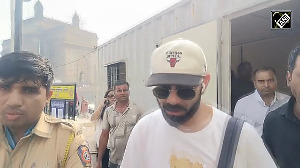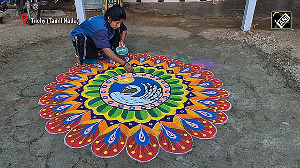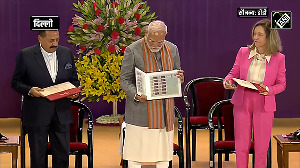In Ganagachettikullam, one of the worst affected villages on the Pondicherry coast, there was this old lady who had lost her baby and kept crying: "I just took her hand in my own and my body language did all the talking," says Bhavana, a volunteer from the Auroville Tsunami Rehabilitation Programme.
Auroville, the international township inspired by the Mother and Sri Aurobindo, which is situated near Pondicherry, was the first to swing into action. On December 26, 2004, barely two hours after the first tsunami wave struck, a first emergency meeting was called in the house of two Aurovilians, Paul Pinton and Laura, and it was immediately decided to set up a camp for the persons affected by the tidal waves.
Auroville rallies to help Pondicherry fisherfolk
Three days later, Auroville realised it was time to switch from immediate relief, to a rehabilitation effort. An office was set-up with computers, phone, faxes and e-mail, the Auroville financial service was put to contribution to channel and account for the contributions which started coming (see below) and two teams were formed to make an assessment of the situation on the ground.
The Auroville rehabilitation story is about caring and it takes three aspects:
Cleaning up and clearing up villages: "Cleaning-up and clearing affected villages, is much more than what it looks like," says Alok, one of the coordinators, "We establish a bond with the villagers, we work with them, we show them that we care, rather than come, distribute goods or cash -- and then disappear after the photo op."
Many of the students of Auroville schools have been engaged in village cleaning, in the worst affected of the coastal fishing communities. At first the villagers watched from a distance with curiosity, sometimes even with a little bit of hostility, but as they saw the enthusiasm of the Auroville children, some of them joined the cleaning effort.
One of the classes of ten year olds were asked to write about their experience, particularly about their reasons to want to help with the cleaning, their job and their feelings during and after the work. The following is an extract from one of the children's writing, a girl from Holland: 'On Thursday, my class and I went to the beach to help clean up the dirt left by the tsunami wave. We wanted to help cleaning very much because I felt really sad after seeing people crying near the streets or broken houses, and hearing horrifying stories. I felt something in my chest telling me I had to do something to help clean up the tsunami disaster. Sometimes people think of children as people that are irresponsible or that can't do anything by themselves. Usually, I find that frustrating. So, I wanted to show that I care about what is happening and I would put some energy to help out a bit.'
Counselling: Aware that it is not only material needs which have to be addressed, but also the psychological needs, the Auroville Tamil Women's Group, consisting of both Western and Indian women, visit the affected villages, not with goods, but with open hearts to listen and sympathise. At first they were a bit unsure about how this would be accepted in the villages, perhaps the people would only be asking for money or material things, but it was quite the opposite that happened.
The lost fishermen of Talaguda
"Our van, recalls Bhavana, one of the leaders of Auroville's Women's Group, brought us down the streets of the village -- we could see how the houses got smaller as we moved closer to the sea -- the richer people had built farther from the shore long ago, and newer poorer houses were of necessity located closer to the water. In one of these streets, with nice houses on either side, a boat was sitting -- it had come up with the wave and been left stranded there. The last couple of rows of houses were the ones built just of mud and thatch -- and you can't see them any more -- just a pile of thatch and some sign of former walls -- all have been washed away."
"We had coached ourselves that our mission was just to listen, so we asked people how they were, what had happened and heard their stories," she continued. "There was a young man who had been caught between who to rescue first -- his children or his old father, he'd chosen his children first, but also managed to bring his father to safety. But now they have nothing.
Another old lady was so traumatised that she took Phoenix, an, American's lady's hand and would not let it go. This work has only started and is bound to take many more months. Two counselling experts are coming from Bangalore to assist with the counselling process. At the moment there is still a big gap between what is given in the area of counselling and what is really needed."
Every day, when the Women's Group goes back to Auroville, they all sit in a circle. Women share how the people they meet had been so grateful for the visit. Some people even said how much they appreciated Auroville. "They said at their temple they always worshipped the sea," recalls Bhavana. "It keeps holding up their boats, giving them fish and livelihood, but now it seems to have turned against them -- perhaps because they have strayed from caring for others. But actually now it seems to them that people do come and listen to their woes. And thus they turn to Auroville with gratitude."
Rebuilding: Donations of Rs 62 lakhs (Rs 6.2 million) have so far been received by the Auroville Rehabilitation Fund. About Rs 10 lakhs (Rs 1 million) have been spent. Rs 21.5 lakhs (Rs 2.15 million) have been received for the AV-Beach community fund, (which have also suffered a lot, Rs 3 lakhs (Rs 300,000) have already been spent. Auroville has a huge know-how in ecological, environment-conscious housing, using natural materials, such as bricks made of compressed red earth available locally.
Only 5% cement I used, and these bricks have shown that they are cheap, provide coolness and are waterproof and termite proof. The Auroville architects and town planners are now ready to put their skills at the service of the rehabilitation housings for all the coastal Pondicherry villages. In an emergency meeting, it was decided that the plinth of the reconstructed houses would be higher than the normal and have certain innovations to permit a flow through of water in case of flooding such as in the case of tsunami.
But to accomplish this, Auroville needs the help of the Tamil Nadu government, as well as the cooperation of the Auroville Secretary, Mr Sharma, an IAS officer posted by the central government.
1. Cheque/Demand Draft to be made payable to 'AUROVILLE FUND'
On the reverse of the cheque please write for Village Flood Relief OR Auroville Beaches Relief. DDs payable at Pondicherry.
Please send the cheques to: Auroville Tsunami Rehabilitation
Opposite Aurelec, Kuilapalayam, Auroville 605 101
Tamil Nadu, India
For e-mail contact:
tsunami@auroville.org.in Phone: 0413 - 2622184Please note that Indian donations are exempted under Section 80G of the Income Tax Act.






 © 2025
© 2025